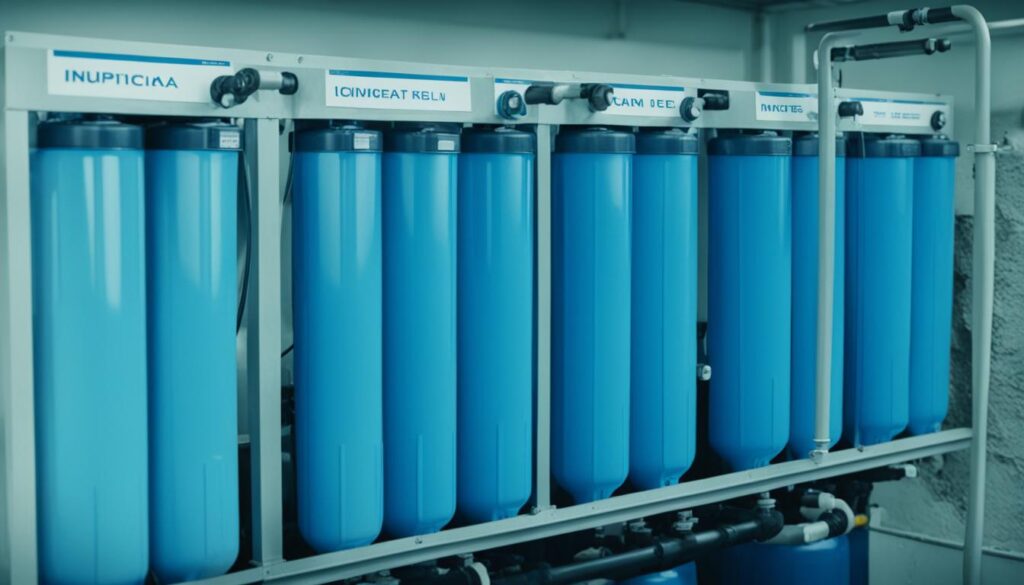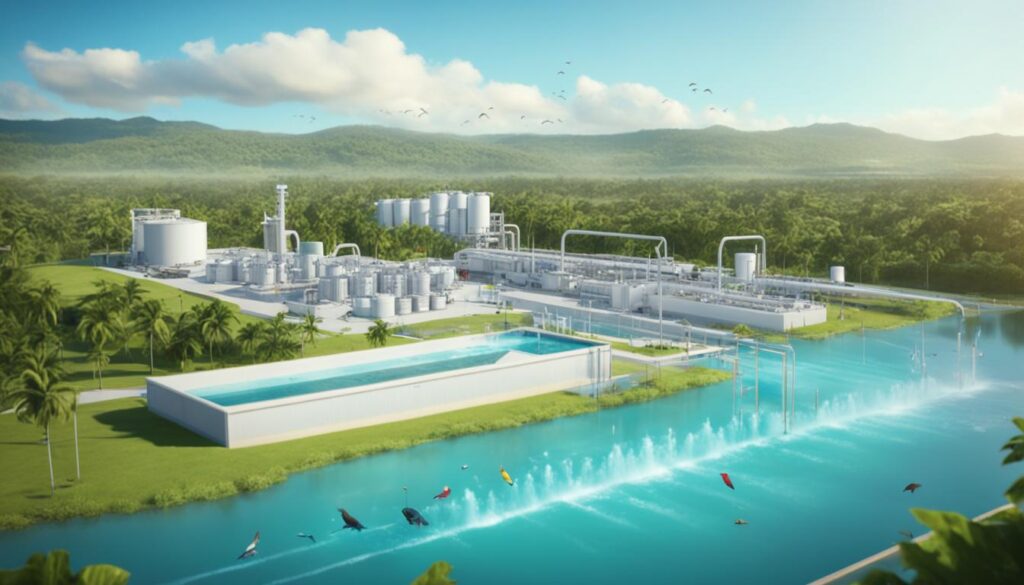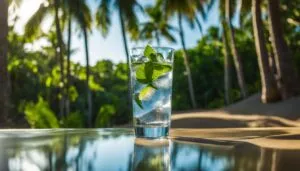When traveling to the beautiful country of Dominican Republic, one of the concerns that may arise is the safety of drinking water. It’s essential to stay informed about the water quality and potential risks to ensure a healthy and enjoyable trip. In this guide, we will explore the current state of water safety in the Dominican Republic and provide you with guidelines to ensure clean and safe drinking water during your stay.
Key Takeaways:
- Water quality in the Dominican Republic can vary depending on the location.
- Contamination risks include inadequate water treatment, sewage disposal, and agricultural runoff.
- It is recommended to drink bottled water or properly treated water.
- Practicing good hygiene and avoiding consumption of raw or undercooked food is crucial in preventing waterborne illnesses.
- Although efforts have been made to improve water treatment and infrastructure, challenges still exist, especially in rural areas.
Water Quality in the Dominican Republic
The water quality in the Dominican Republic can vary significantly depending on the location. While some areas have safe and potable water, there are also areas where the water may be contaminated with bacteria or other pollutants. It is crucial to be aware of these risks and take precautions to ensure the safety of the water you consume.
The main sources of water contamination in the Dominican Republic include inadequate water treatment, sewage disposal, and agricultural runoff. In areas with inadequate water treatment, the water may not be properly purified, increasing the risk of harmful bacteria and contaminants.
Sewage disposal is another significant factor contributing to water contamination. Improper disposal of sewage can lead to the release of harmful pathogens and pollutants into water sources, further compromising the water quality.
Agricultural runoff is another concern in the Dominican Republic. Pesticides, fertilizers, and other agricultural chemicals can infiltrate water sources, causing pollution and potential health risks.
Water Contamination Risks
The risks associated with water contamination include the potential for waterborne illnesses. Consuming contaminated water can lead to various illnesses such as diarrhea, cholera, hepatitis A, and typhoid. These illnesses are caused by bacteria, viruses, or parasites that can be present in contaminated water sources. It is essential to take necessary precautions to prevent these illnesses and prioritize safe drinking water practices.
By being aware of the water quality in different areas of the Dominican Republic and taking appropriate measures to ensure the safety of the water you consume, you can significantly reduce the risks associated with water contamination.
| Type of Contamination | Main Sources |
|---|---|
| Bacteria | Inadequate water treatment, sewage disposal |
| Chemical pollutants | Agricultural runoff, industrial waste |
| Parasites | Contaminated water sources |
Drinking Water Guidelines in the Dominican Republic
To ensure safe drinking water in the Dominican Republic, it is recommended to follow these guidelines:
- Drink bottled water or filtered water: Choosing bottled water or water that has been properly filtered can help eliminate potential contaminants. Make sure to check the seal of the bottle and purchase from reputable sources.
- Boil tap water: If you don’t have access to bottled water, boiling tap water for at least one minute can be an effective method to kill harmful bacteria and parasites.
- Avoid questionable sources: It is important to avoid consuming water from questionable sources such as street vendors or unverified sources. Stick to reliable sources of water.
- Use bottled or treated water for brushing teeth and washing fruits and vegetables: To prevent any potential contamination, it is recommended to use bottled water or water that has been properly treated when brushing teeth or washing fruits and vegetables.
By following these guidelines, you can ensure that the water you consume in the Dominican Republic is clean and safe. Remember to prioritize your health and take necessary precautions to prevent waterborne illnesses.

Water Treatment in the Dominican Republic
The Dominican Republic has made efforts to improve water treatment and infrastructure in recent years. The government has invested in upgrading water treatment plants and implementing stricter regulations for water quality.
However, challenges still remain, especially in rural areas where access to clean and safe drinking water may be limited. It is important for travelers to be aware of these challenges and take necessary precautions to ensure the safety of the water they consume.
Health Concerns Related to Water in the Dominican Republic
The consumption of unsafe water in the Dominican Republic can lead to various waterborne illnesses such as diarrhea, cholera, hepatitis A, and typhoid. These illnesses are caused by bacteria, viruses, or parasites that can be present in contaminated water. It is important to be aware of the symptoms of these illnesses and take necessary precautions to prevent them.
When traveling in the Dominican Republic, follow these guidelines to minimize the risk of waterborne illnesses:
- Practice good hygiene: Wash your hands frequently with soap and clean water, especially before eating or preparing food.
- Consume safe water and food: Drink bottled water or use water that has been properly treated or boiled. Avoid drinking tap water or using it for brushing teeth and rinsing fruits and vegetables.
- Get vaccinated: Consult with a healthcare professional about recommended vaccinations for travel to the Dominican Republic, such as hepatitis A and typhoid vaccines.
If you experience any symptoms of a waterborne illness during your trip, such as persistent diarrhea, vomiting, or fever, seek medical attention immediately. It is important to stay hydrated and receive proper medical treatment to prevent complications.
Protecting Your Health
«Waterborne illnesses can quickly ruin your trip. By taking necessary precautions and prioritizing your health, you can enjoy a safe and memorable stay in the Dominican Republic.»
Remember, prevention is key when it comes to waterborne illnesses. By practicing good hygiene, consuming safe water and food, and seeking necessary medical attention, you can reduce the risk of falling ill during your time in the Dominican Republic.
| Waterborne Illness | Symptoms | Prevention |
|---|---|---|
| Diarrhea | Watery stools, abdominal cramps, fever | Consume safe water and food, practice good hygiene |
| Cholera | Severe diarrhea, vomiting, rapid heart rate | Drink bottled water, avoid consuming raw or undercooked seafood |
| Hepatitis A | Fatigue, nausea, jaundice (yellowing of the skin) | Get vaccinated, practice good hygiene |
| Typhoid | Fever, headache, stomach pain, rash | Get vaccinated, drink bottled water |
Water Treatment and Infrastructure in the Dominican Republic
The Dominican Republic has made significant efforts to improve water treatment and infrastructure in recent years. The government has invested in upgrading water treatment plants and implementing stricter regulations to ensure water quality. However, despite these improvements, challenges still exist, particularly in rural areas where access to clean and safe drinking water may be limited.
Improving water treatment is crucial for ensuring the availability of clean water for all residents and visitors. Upgrading treatment plants helps remove harmful contaminants from the water supply, reducing the risk of waterborne illnesses. Stricter regulations also play a vital role in monitoring and maintaining water quality standards, protecting public health.
While progress has been made, it is important for travelers to be aware of the ongoing challenges in water treatment and infrastructure. In some rural areas, limited resources and infrastructure can pose obstacles to providing clean and safe drinking water. This is especially true in remote communities where access to centralized treatment facilities may be limited. As a result, it is essential for travelers to take necessary precautions to ensure the safety of the water they consume.
One way to ensure access to clean water is by utilizing alternative water sources such as bottled water. Bottled water is widely available and can be purchased at supermarkets, convenience stores, and hotels throughout the Dominican Republic. It is important to check the seal of the bottle before purchasing to ensure its authenticity.
Additionally, using water filters or purification tablets can provide an extra layer of protection when dealing with tap water. These methods help remove harmful contaminants and ensure the water you consume is safe.
«Access to clean and safe drinking water is a fundamental human right. While improvements have been made, it is crucial to continue working towards providing clean water for all residents and visitors in the Dominican Republic.»
Despite the challenges in water treatment and infrastructure, the Dominican Republic is committed to improving access to clean water for its population. Continued investments in upgrading treatment facilities and implementing sustainable water management practices will contribute to the long-term goal of ensuring clean water access for all.
| Challenges in Water Treatment | Impact |
|---|---|
| Limited resources and infrastructure in rural areas | Difficulty in providing clean and safe drinking water to remote communities |
| Inadequate water treatment systems | Potential contamination of water sources leading to waterborne illnesses |
| Budget constraints | Limitations in funding for infrastructure upgrades and maintenance |
Despite these challenges, the Dominican Republic is committed to raising water treatment standards and ensuring clean water access throughout the country. The collaboration between the government and various stakeholders will help address the existing issues and contribute to a healthier and safer environment for residents and visitors alike.

Bottled Water and Other Safe Water Options
When it comes to drinking water in the Dominican Republic, one of the safest options is bottled water. It is widely available and can be conveniently purchased at supermarkets, convenience stores, and hotels. To ensure the quality and safety of the bottled water you buy, make sure to check the seal of the bottle and ensure it has not been tampered with before making your purchase.
Aside from bottled water, there are other safe water options for travelers in the Dominican Republic. These alternatives can help provide clean and safe drinking water:
- Water Filters: Using water filters can be an effective way to treat tap water and remove harmful contaminants. There are various types of water filters available, such as activated carbon filters and reverse osmosis filters.
- Water Purification Tablets: Another option is to use water purification tablets, which are compact and easy to carry. These tablets work by releasing chemicals that kill bacteria, viruses, and parasites present in the water.
Both water filters and purification tablets can be purchased at outdoor and camping supply stores or online. They offer convenience and peace of mind by providing an additional layer of protection against waterborne illnesses.
Choosing the Right Water Filter or Purification Tablet
When selecting a water filter or purification tablet, it is important to consider factors such as the effectiveness of the treatment method, the lifespan of the filter or tablet, and any specific needs or preferences you may have. Researching and comparing different products can help you make an informed decision.
Pro Tip: If you plan on using a water filter or purification tablet, always follow the manufacturer’s instructions for proper usage and maintenance.
Comparing Bottled Water, Water Filters, and Purification Tablets
| Bottled Water | Water Filters | Purification Tablets | |
|---|---|---|---|
| Availability | Widely available | Requires purchase and portability | Requires purchase and portability |
| Initial Cost | Varies depending on brand and size | Varies depending on type and brand | Varies depending on brand and quantity |
| Long-Term Cost | Can be more expensive over time if frequently purchased | May require filter replacements | Requires periodic repurchase |
| Treatment Method | Pre-bottled and quality-controlled | Removes contaminants through filtration | Kills bacteria, viruses, and parasites chemically |
Water Safety Tips for Travelers
To ensure water safety while traveling in the Dominican Republic, it is important to follow these tips:
Drink bottled water or treated water. It is advisable to consume bottled water or water that has been properly filtered or treated to ensure its safety. This will help minimize the risk of waterborne illnesses.
Avoid consuming water from questionable sources. It is best to refrain from drinking water from unreliable or unverified sources. Stick to bottled water or water from reputable establishments to reduce the chances of water contamination.
Use bottled or treated water for brushing teeth and washing fruits and vegetables. To avoid any potential exposure to harmful bacteria or parasites, it is recommended to use bottled water or water that has been properly treated for activities such as brushing your teeth or washing produce.
Practice good hygiene. Regularly wash your hands with soap and water or use hand sanitizer, especially before eating or handling food. This simple practice can help prevent the spread of germs and maintain personal hygiene.
Avoid consuming raw or undercooked food. Raw or undercooked food, including seafood and meat, can pose a higher risk of foodborne illnesses. Ensure that all food is properly cooked and served at a safe temperature.
Avoid ice cubes in drinks unless they are made with safe water. Ice cubes can be a potential source of water contamination. Unless you are sure that the ice cubes are made from safe water, it is advisable to skip adding them to your drinks.
Carry a water bottle with you and refill it from reliable sources. Having a reusable water bottle can be convenient, allowing you to stay hydrated throughout your travels. However, ensure that you refill it from safe and reliable water sources to maintain water safety.
By following these water safety tips, you can reduce the risk of consuming contaminated water and enjoy a safe and healthy trip to the Dominican Republic.
Common Misconceptions about Water Safety in the Dominican Republic
When it comes to water safety in the Dominican Republic, there are several misconceptions that travelers should be aware of. These misconceptions can lead to false assumptions and potentially put your health at risk. Let’s debunk some of the most common myths:
- Myth 1: Boiling tap water or using tap water for cooking removes all contaminants.
- Myth 2: All bottled water in the Dominican Republic is safe to drink.
While boiling tap water can kill some harmful bacteria and parasites, it may not remove other contaminants, such as heavy metals or chemicals. It’s important to understand that boiling alone may not guarantee the safety of the water. Using proper water treatment methods, like filtration or disinfection, is essential to ensure the removal of a wide range of contaminants.
While bottled water is generally a safer option than tap water, not all bottled water in the Dominican Republic meets the same quality standards. It’s crucial to check the seal of the bottle and purchase from reliable sources to ensure the authenticity and safety of the water. Look for reputable brands and establishments that prioritize water quality.
By understanding and dispelling these misconceptions, you can make more informed decisions about the water you consume in the Dominican Republic. Remember, prioritizing your health and safety should always be the top priority.
Book a Free Appointment Now!
If you have any concerns or questions regarding water safety during your trip to the Dominican Republic, our team at JJ Studio is here to help! We offer free appointments with our travel experts who can provide you with personalized advice and guidance. Don’t hesitate to reach out to us at âï¸+1 849 387 9900 or visit our website jjstudiophoto.com to schedule your appointment today. Your peace of mind is our priority!
| Common Misconception | Fact |
|---|---|
| Boiling tap water guarantees its safety. | Boiling tap water may not remove all contaminants. Proper water treatment methods are necessary. |
| All bottled water is safe to drink. | Not all bottled water in the Dominican Republic meets the same quality standards. Check the seal and purchase from reliable sources. |
Water Conservation Efforts in the Dominican Republic
Water conservation is an important issue in the Dominican Republic. The country faces challenges in managing its water resources, especially during the dry seasons. Efforts have been made to promote sustainable water practices, such as implementing water-saving technologies, promoting awareness about water conservation, and improving water management systems.
One of the key initiatives in water conservation is the implementation of water-saving technologies. This includes the use of efficient irrigation systems, rainwater harvesting, and the installation of low-flow fixtures. These technologies help reduce water usage and minimize wastage, ensuring a more sustainable approach to water consumption.
Another crucial aspect of water conservation is raising awareness among the public. Educational campaigns and programs have been launched to inform residents and tourists about the importance of saving water and adopting sustainable practices. By educating individuals about simple actions they can take, such as shorter showers, fixing leaks, and only watering gardens when necessary, everyone can contribute to conserving water resources.
Furthermore, improving water management systems is essential for sustainable water practices. This includes implementing better water infrastructure, monitoring and controlling water use, and implementing regulations to prevent water misuse. These measures help ensure the efficient allocation of water resources and prevent unnecessary waste.
Travelers can also play a role in water conservation during their stay in the Dominican Republic. By practicing responsible water usage, such as taking shorter showers, turning off the tap while brushing teeth, and reusing towels, visitors can help conserve water and minimize their environmental impact.
Water Conservation Tips for Travelers:
- Take shorter showers to minimize water usage.
- Turn off the tap while brushing your teeth or shaving.
- Reuse towels instead of requesting new ones daily.
- Avoid excessive watering of gardens or lawns.
- Report any water leaks or issues to the appropriate authorities.
By adopting these small but impactful actions, travelers can contribute to water conservation efforts in the Dominican Republic and promote sustainable water practices.
Remember, every drop counts! Together, we can ensure a more sustainable future for water resources in the Dominican Republic.
Resources for Water Safety in the Dominican Republic
If you are planning a trip to the Dominican Republic, it is essential to prioritize water safety. To help you stay informed and make the right choices, here are some valuable resources to consult:
- CDC Traveler’s Health Website: The Centers for Disease Control and Prevention (CDC) offers comprehensive information on travel health, including recommendations for safe drinking water in the Dominican Republic.
- Official Government Websites: Visit the official websites of the Dominican Republic’s Ministry of Public Health (www.sespas.gov.do) and Ministry of Tourism (www.godominicanrepublic.com) for up-to-date information on water safety and travel advisories.
- U.S. Department of State: The official travel website provides country-specific information, including safety alerts and tips for travelers visiting the Dominican Republic.
- Travel Guides: Popular travel guidebooks such as Lonely Planet, Fodor’s, and Rough Guides offer insights into water safety and general travel information for the Dominican Republic. Check out their websites or purchase their guidebooks for detailed recommendations.
Remember to Stay Informed and Prepared
Before your trip, it is essential to check these resources frequently for any updates or alerts regarding water safety in the Dominican Republic. Being informed and prepared will give you peace of mind and allow you to enjoy a safe and memorable journey.
Now that you have access to valuable water safety resources, you can confidently plan your trip to the Dominican Republic. Remember, prioritizing your health and well-being is crucial for a fulfilling travel experience.
Stay informed, stay safe, and have a fantastic time exploring the beautiful Dominican Republic!
The Importance of Safe Drinking Water While Traveling
Safe drinking water is crucial for maintaining good health while traveling. Consuming contaminated water can lead to waterborne illnesses, which can spoil your trip and cause discomfort. It is important to prioritize water safety and take necessary precautions to prevent any health risks. By following safe drinking water guidelines and practicing good hygiene, you can enjoy your trip to the Dominican Republic without worrying about water-related health issues.
When traveling, it’s easy to overlook the importance of safe drinking water. However, the consequences of consuming contaminated water can be severe and can significantly impact your travel experience. Waterborne illnesses such as diarrhea, cholera, hepatitis A, and typhoid are all potential risks associated with unsafe drinking water. These illnesses can not only be debilitating but also require medical attention and can disrupt your travel plans.
One of the best ways to ensure safe drinking water while traveling is to stick to bottled water or properly treated water. Bottled water is widely available in the Dominican Republic and can be purchased at supermarkets, convenience stores, and hotels. It is crucial to check the seal of the bottle and ensure it is not tampered with before purchasing.
«Safe drinking water is crucial for maintaining good health while traveling.»
Tips for Ensuring Safe Drinking Water in Any Destination
Whether you are traveling to the Dominican Republic or any other destination, it is important to prioritize safe drinking water. Follow these general tips to ensure water safety:
- Drink bottled water or properly treated water.
- Avoid consuming water from questionable sources.
- Use bottled or treated water for brushing teeth and washing fruits and vegetables.
- Practice good hygiene, such as washing hands with soap and water or using hand sanitizer.
- Be aware of potential waterborne illnesses and take necessary precautions to avoid them.
- Stay updated on water quality alerts and follow recommended guidelines.
- Carry a water bottle with you and refill it from reliable sources.
Conclusion
In conclusion, ensuring the safety of drinking water in the Dominican Republic is vital for a healthy and enjoyable trip. It is crucial to be mindful of the potential risks associated with water contamination and take necessary precautions to protect yourself and your loved ones.
By following the recommended guidelines, such as drinking bottled or properly treated water, practicing good hygiene, and using safe water sources for brushing teeth and washing fruits and vegetables, you can significantly reduce the risk of waterborne illnesses.
Remember that the water quality in the Dominican Republic may vary depending on the location, so it is essential to stay informed and stay updated on any alerts or changes regarding water safety. By taking these steps, you can ensure a safe and memorable trip to the Dominican Republic.







